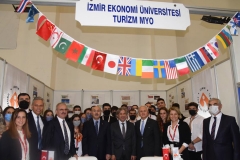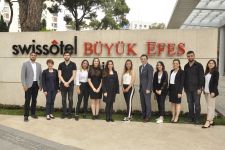
VOCATIONAL SCHOOL
Department of Tourism and Hotel Management (Turkish)
MTOI 230 | Course Introduction and Application Information
| Course Name |
Consumer Behavior
|
|
Code
|
Semester
|
Theory
(hour/week) |
Application/Lab
(hour/week) |
Local Credits
|
ECTS
|
|
MTOI 230
|
Fall/Spring
|
3
|
0
|
3
|
5
|
| Prerequisites |
None
|
|||||
| Course Language |
Turkish
|
|||||
| Course Type |
Elective
|
|||||
| Course Level |
Short Cycle
|
|||||
| Mode of Delivery | face to face | |||||
| Teaching Methods and Techniques of the Course | Group WorkLecture / Presentation | |||||
| Course Coordinator | - | |||||
| Course Lecturer(s) | ||||||
| Assistant(s) | - | |||||
| Course Objectives | The aim of this course is to gain an understanding regarding to the concepts and theories of consumer behavior. The aim is to inform students about main internal and external factors affecting the consumer buying behaviour and decisions. |
| Learning Outcomes |
The students who succeeded in this course;
|
| Course Description | The role of consumer behavior in marketing; consumer psychology, neuroscience, anthropology and sociology; consumer buying behavior and digital consumption and markets will be the main topics of the course. |
|
|
Core Courses | |
| Major Area Courses | ||
| Supportive Courses |
X
|
|
| Media and Management Skills Courses | ||
| Transferable Skill Courses |
WEEKLY SUBJECTS AND RELATED PREPARATION STUDIES
| Week | Subjects | Related Preparation |
| 1 | Introduction to the course | Lecture Notes |
| 2 | Consumption society and consumer culture | |
| 3 | Consumer behavior theory | |
| 4 | Consumer Psychology: Perception | Koç, E. (2012). Algılama. In Tüketici davranışı ve pazarlama stratejileri: Global ve yerel yaklaşım. İstanbul: Seçkin. |
| 5 | Consumer Psychology: Learning & Memory | Koç, E. (2012). Öğrenme ve hafıza. In Tüketici davranışı ve pazarlama stratejileri: Global ve yerel yaklaşım. İstanbul: Seçkin. |
| 6 | Consumer Psychology: Motivation & Involvement | Koç, E. (2012). Motivasyon ve İlgilenim. In Tüketici davranışı ve pazarlama stratejileri: Global ve yerel yaklaşım. İstanbul: Seçkin. |
| 7 | Consumer Psychology: Attitudes | Koç, E. (2012). Tutumlar. In Tüketici davranışı ve pazarlama stratejileri: Global ve yerel yaklaşım. İstanbul: Seçkin. |
| 8 | Midterm Exam | |
| 9 | Consumer Psychology: Self and Personality | Koç, E. (2012). Benlik ve kişilik. In Tüketici davranışı ve pazarlama stratejileri: Global ve yerel yaklaşım. İstanbul: Seçkin. |
| 10 | Consumer Neuroscience | Kılınç, O. E., & Yavuz, Ö. (2016). “Nöro pazarlama”ya giriş. İstanbul: Ortak İleişim. |
| 11 | Consumer anthropology: Values, lifestyles and culture | Kılınç, O. E., & Yavuz, Ö. (2016). “Nöro pazarlama”ya giriş. İstanbul: Ortak İleişim. |
| 12 | Consumer Sociology: Reference Groups, Family & Gender | Koç, E. (2012). Değerler, yaşam biçimleri ve kültür. In Tüketici davranışı ve pazarlama stratejileri: Global ve yerel yaklaşım. İstanbul: Seçkin. |
| 13 | Consumer purchase decision process | |
| 14 | Student presentations | |
| 15 | Review of the semester | |
| 16 | Final Exam |
| Course Notes/Textbooks | Koç, E. (2012). Tüketici davranışı ve pazarlama stratejileri: Global ve yerel yaklaşım. İstanbul: Seçkin. |
| Suggested Readings/Materials | Kılınç, O. E., & Yavuz, Ö. (2016). “Nöro pazarlama”ya giriş. İstanbul: Ortak İleişim. |
EVALUATION SYSTEM
| Semester Activities | Number | Weigthing |
| Participation |
1
|
10
|
| Laboratory / Application | ||
| Field Work | ||
| Quizzes / Studio Critiques | ||
| Portfolio | ||
| Homework / Assignments | ||
| Presentation / Jury |
1
|
20
|
| Project | ||
| Seminar / Workshop | ||
| Oral Exams | ||
| Midterm |
1
|
30
|
| Final Exam |
1
|
40
|
| Total |
| Weighting of Semester Activities on the Final Grade |
3
|
60
|
| Weighting of End-of-Semester Activities on the Final Grade |
1
|
40
|
| Total |
ECTS / WORKLOAD TABLE
| Semester Activities | Number | Duration (Hours) | Workload |
|---|---|---|---|
| Theoretical Course Hours (Including exam week: 16 x total hours) |
16
|
3
|
48
|
| Laboratory / Application Hours (Including exam week: '.16.' x total hours) |
16
|
0
|
|
| Study Hours Out of Class |
15
|
3
|
45
|
| Field Work |
0
|
||
| Quizzes / Studio Critiques |
0
|
||
| Portfolio |
0
|
||
| Homework / Assignments |
0
|
||
| Presentation / Jury |
1
|
15
|
15
|
| Project |
0
|
||
| Seminar / Workshop |
0
|
||
| Oral Exam |
0
|
||
| Midterms |
1
|
20
|
20
|
| Final Exam |
1
|
22
|
22
|
| Total |
150
|
COURSE LEARNING OUTCOMES AND PROGRAM QUALIFICATIONS RELATIONSHIP
|
#
|
Program Competencies/Outcomes |
* Contribution Level
|
||||
|
1
|
2
|
3
|
4
|
5
|
||
| 1 | Has a basic knowledge of major theories, phenomena, concepts, and principles in the field of tourism. |
|||||
| 2 | Associate the professional knowledge acquired in the field with other disciplines and use it in the field of application. |
X | ||||
| 3 | Uses modern techniques and tools required to perform tourism services. |
|||||
| 4 | Uses computer software, automation systems and information technologies as required by the field of tourism and hotel management. |
|||||
| 5 | Improves himself / herself by following the developments in his / her field with the awareness of lifelong learning. |
X | ||||
| 6 | Has basic knowledge of legal regulations, professional standards, ethical principles, and professional awareness in the field. |
X | ||||
| 7 | Communicates effectively with guests and collaborators in written and verbal expressions. |
X | ||||
| 8 | Develops creative and innovative solutions individually and as a team to possible problems that may be encountered in tourism services. |
|||||
| 9 | Has knowledge on occupational safety, worker health, environmental protection and has quality awareness. |
|||||
| 10 | Demonstrates reading, understanding, speaking, and writing skills in English at least at the A2 level of the European Language Portfolio. |
|||||
| 11 | Follows the information about tourism and hotel management and communicates with colleagues using two foreign languages. |
|||||
*1 Lowest, 2 Low, 3 Average, 4 High, 5 Highest
NEWS |ALL NEWS

IUE Students at Travel Turkey
Izmir University of Economics (IUE) Vocational School, Tourism and Hotel Management Program opened a booth in Travel Turkey Izmir, one of the

Tourism students of IUE working at Swissotel
Students of tourism and hospitality management program at Izmir University of Economics Vocational School have started to have impact on the sector.






